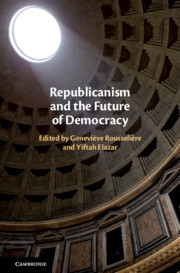Description
Republicanism and the Future of Democracy
Coordinators: Elazar Yiftah, Rousselière Geneviève
Explores how republican political thought can make a constructive and distinctive contribution to our understanding of democracy and the challenges it faces.
Language: English
Subject for Republicanism and the Future of Democracy:
Publication date: 04-2019
306 p. · 15.7x23.4 cm · Hardback
306 p. · 15.7x23.4 cm · Hardback
Description
/li>Contents
/li>Biography
/li>
Democracies are in crisis. Can republican theory contribute to reforming our political norms and institutions? The 'neo-republican turn' has seen scholars using the classical republican tradition in reconstructing and developing a vision of public life as an alternative to liberalism. This volume offers new perspectives from leading scholars on how republicanism can help transform democratic theory and respond to some of its most pressing challenges. Drawing on this recent revival of republican political thought, its chapters reflect on such issues as the republican definition of freedom as nondomination and its relation to democracy and populism, the ideal of the common good, domination in the workplace and in the family, republicanism in a globalized world, and radical republican politics. It will appeal to researchers and students in political theory, political philosophy and the history of ideas, and anyone interested in gaining greater insight into the prospects and challenges of republican democracy in today's world.
Introduction. Republicanizing democracy, democratizing the republic Geneviève Rousselière and Yiftah Elazar; Part I. Republican Democracy and the Common Good: 1. The general will, the common good, and a democracy of standards Philip Pettit; Part II. Republicanism and Historical Challenges of Democratic Politics: 2. Of demagogues and populists: on the relevance of Roman republicanism to democracy Daniel Kapust; 3. Republicanism and democracy: the tyranny of the majority in eighteenth century political debate Annelien de Dijn; Part III. Non-Domination as a Democratic Ideal: 4. Democratic dependency: a feminist critique of non-domination as independence Lida Maxwell; 5. Being under the power of others Niko Kolodny; Part IV. Democratizing the Republic, Republicanizing Democracy: 6. Republicanism and democracy revisited Frank Lovett; 7. The new ochlophobia? Populism, majority rule and prospects for democratic republicanism John P. McCormick; 8. Democracy and republicanism: a difficult partnership Nadia Urbinati; Part V. Republican Democracy in the Workplace and the Market: 9. Liberty and democratic insurgency: the republican case for the right to strike Alex Gourevitch; 10. Workplace governance and republican theory Elizabeth Anderson; 11. Republicanism and markets Robert S. Taylor; Part VI. Republican Democracy Beyond the State: 12. A European republic of sovereign states: sovereignty, republicanism, and the EU Richard Bellamy; 13. Horizontalism, public assembly, and the politics of republican democracy Stuart White.
Yiftah Elazar is Lecturer in Political Science at the Hebrew University of Jerusalem. He has written on Jeremy Bentham, Adam Ferguson, and Adam Smith, and is working on a book on the revolutionary republicanism of Richard Price.
Geneviève Rousselière is Assistant Professor of Political Science at Duke University, North Carolina. She has published articles on Rousseau, Constant, and Kant. She is finishing a book on French republicanism.
Geneviève Rousselière is Assistant Professor of Political Science at Duke University, North Carolina. She has published articles on Rousseau, Constant, and Kant. She is finishing a book on French republicanism.
© 2024 LAVOISIER S.A.S.
These books may interest you

Republicanism in Northeast Asia 172.36 €

Republicanism in Northeast Asia 58.78 €


